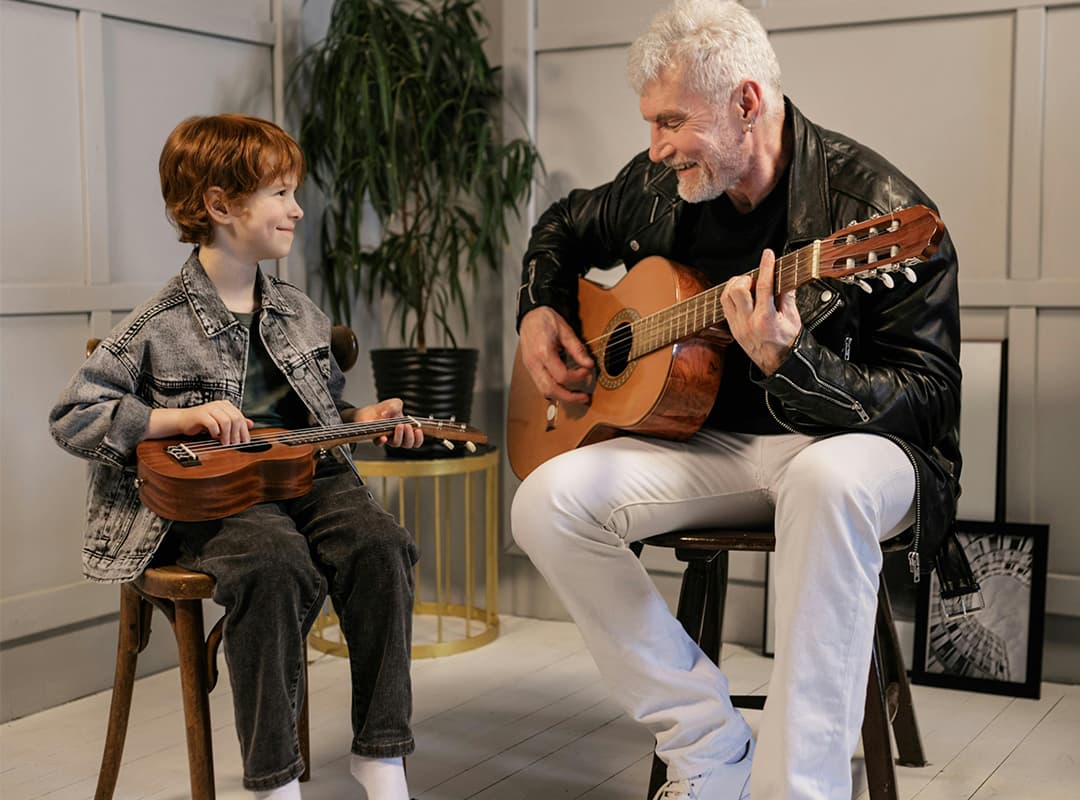Learning to play the guitar is a dream for many people, but some may wonder if they have what it takes to start. The truth is, anyone can learn to play guitar, regardless of age, background, or experience. Whether you’re young or old, have a musical background or none at all, picking up the guitar is an exciting and rewarding journey. Let’s explore who can learn to play guitar and why it’s never too late or too early to begin.
1. Children and Teenagers
Many guitarists begin their journey as children, often inspired by their favorite bands or songs. Starting young has some benefits—children tend to pick up new skills quickly, and their hands adapt well to the physical demands of playing an instrument. Additionally, kids often have a natural curiosity that makes learning an instrument fun and exciting.
- Why kids should learn guitar: Learning guitar at a young age helps with brain development, improves memory, and teaches discipline. It’s also a great way to boost creativity and confidence.
- Is there a right age? Kids can start learning guitar as early as 5 or 6 years old, though this varies based on the child’s interest and physical development. For younger children, smaller guitars are available, making it easier for them to hold and play.
Starting young doesn’t guarantee success, but it does lay a strong foundation for future musical growth.
2. Adults
Many adults worry that they’ve missed their chance to learn guitar, but this couldn’t be further from the truth. In fact, adults often have a strong motivation to learn, whether it’s for personal fulfillment, relaxation, or the joy of finally playing that one Lebnon song they’ve loved for years.
- Why adults should learn guitar: Learning an instrument as an adult can improve mental health, reduce stress, and serve as a creative outlet. It’s also a great way to challenge your brain and stay sharp as you age.
- Balancing practice with life: While adults may have busy schedules, carving out just 10–15 minutes a day for practice can lead to significant progress. The key is consistency.
Many adults are surprised at how quickly they can pick up basic skills with regular practice, and they often find guitar to be a rewarding hobby that fits well into their lives.
3. Seniors
Learning guitar isn’t just for the young or middle-aged—seniors can also benefit from playing the instrument. In fact, playing guitar later in life can be especially beneficial for improving cognitive function and keeping hands agile.
- Why seniors should learn guitar: Music has been shown to have therapeutic effects, boosting mood, and keeping the mind active. Learning guitar also helps improve coordination and dexterity, both of which are important for aging adults.
- Overcoming physical challenges: While seniors may face some physical challenges, such as arthritis or limited mobility, there are ways to adapt. Lighter gauge strings or even using a classical guitar with nylon strings can reduce finger strain and make playing more comfortable.
For seniors, playing guitar can be a source of joy, relaxation, and social connection, whether they’re playing for themselves or performing for others.
4. People with Disabilities
The guitar is an instrument that can be adapted for many physical or cognitive disabilities. Whether you have limited hand mobility, hearing impairments, or cognitive challenges, there are creative ways to make playing the guitar accessible.
- Adaptations for physical limitations: For individuals with limited finger mobility, using a slide or a capo can help simplify playing. Adaptive picks or fingerpicks are also available for those who have difficulty holding a standard pick.
- Hearing impairments: Vibrations from the guitar can be felt through the body, allowing those with hearing impairments to experience the music in a different way. Visual aids, such as guitar tabs or chord charts, can also help.
Guitar lessons can be tailored to meet the specific needs of any student, ensuring that everyone has the opportunity to learn and enjoy music.
5. Complete Beginners
You don’t need any prior musical experience to learn guitar. Many beginners start with no background in music theory or instrument playing, and that’s perfectly fine! Guitar is one of the most accessible instruments, and you can start playing simple songs within weeks of practice.
- Start simple: For beginners, focusing on basic chords and strumming patterns is the best way to get started. With just a few chords, you can play hundreds of songs.
- The learning curve: While there is a learning curve, especially when it comes to finger placement and coordination, most beginners find that with regular practice, they can quickly move beyond the basics.
If you’re a complete beginner, know that learning guitar is a gradual process. Start small, celebrate your progress, and enjoy the journey.
So, who can learn to play guitar? The answer is simple: anyone. Whether you’re a child inspired by your favorite band, an adult looking for a creative outlet, or a senior wanting to keep your mind and hands active, the guitar is a versatile and accessible instrument for all ages and abilities. You don’t need to be a professional musician or have years of experience to enjoy the magic of playing guitar.
The most important factor in learning guitar is not age, ability, or background—it’s motivation. If you have a desire to learn and are willing to put in regular practice, you can master the guitar at any stage of life. So pick up that guitar and start making music—you might just surprise yourself with what you can achieve! Whether you’re strumming along to your favorite Lebanon song or learning a new tune, the guitar can be a lifelong source of joy and creativity.


